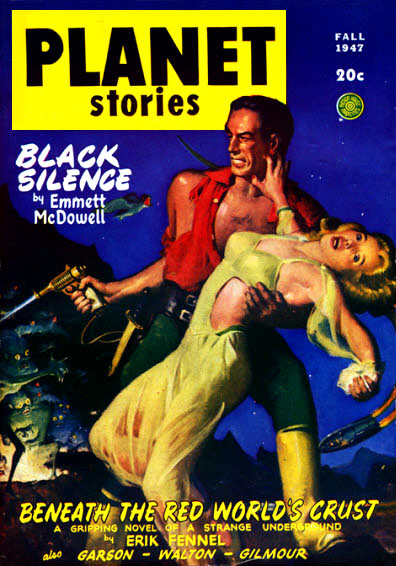planetary romance on:
[Wikipedia]
[Google]
[Amazon]
 Planetary romance Allen Steele, ''Captain Future - the Horror at Jupiter''
Planetary romance Allen Steele, ''Captain Future - the Horror at Jupiter''
p .195
/ref> (other synonyms are sword and planet, and planetary adventure) is a subgenre of

Planetary romance
on
 Planetary romance Allen Steele, ''Captain Future - the Horror at Jupiter''
Planetary romance Allen Steele, ''Captain Future - the Horror at Jupiter''p .195
/ref> (other synonyms are sword and planet, and planetary adventure) is a subgenre of
science fiction
Science fiction (often shortened to sci-fi or abbreviated SF) is a genre of speculative fiction that deals with imaginative and futuristic concepts. These concepts may include information technology and robotics, biological manipulations, space ...
or science fantasy
file:Warhammer40kcosplay.jpg, Cosplay of a character from the ''Warhammer 40,000'' tabletop game; one critic has characterized the game's setting as "action-oriented science-fantasy."
Science fantasy is a hybrid genre within speculative fiction ...
in which the bulk of the action consists of adventures on one or more exotic alien planets, characterized by distinctive physical and cultural backgrounds. Some planetary romances take place against the background of a future culture where travel between worlds by spaceship is commonplace; others, particularly the earliest examples of the genre, do not, invoking flying carpets, astral projection
In Western esotericism, esotericism, astral projection (also known as astral travel, soul journey, soul wandering, spiritual journey, spiritual travel) is an intentional out-of-body experience (OBE) in which a subtle body, known as the astra ...
, or other methods of getting between planets. In either case, it is the planetside adventures that are the focus of the story, not the mode of travel.
A significant precursor of the genre is Edwin L. Arnold's '' Lieut. Gullivar Jones: His Vacation'' (1905).
In '' Science Fiction: The 100 Best Novels'' (1985), editor and critic David Pringle
David Pringle (born 1 March 1950) is a Scottish science fiction editor and critic.
Pringle served as the editor of '' Foundation'', an academic journal, from 1980 to 1986, during which time he became one of the prime movers of the collective whi ...
named Marion Zimmer Bradley and Anne McCaffrey
Anne Inez McCaffrey (1 April 1926 – 21 November 2011) was an American writer known for the ''Dragonriders of Pern'' science fiction series. She was the first woman to win a Hugo Award for fiction (Best Novella, ''Weyr Search'', 1968) an ...
as two "leading practitioners nowadays" for the planetary romance type of science fiction.David Pringle, '' Science Fiction: The 100 Best Novels: An English-language Selection, 1949–1984'', London: Xanadu Publ., 1985. p. 17. Pringle does not include any Bradley or McCaffrey novels. Introducing his selections, he says, "I admit to blind spots—for example, I have little affection for the type of sf story which has been called 'planetary romance.
Comparison with other subgenres
''The Encyclopedia of Science Fiction
''The Encyclopedia of Science Fiction'' (''SFE'') is an English language reference work on science fiction, first published in 1979. It has won the Hugo Award, Hugo, Locus Award, Locus and BSFA Award, British SF Awards. Two print editions appea ...
'' mentions two caveats as to the usage of the term. First, while the setting may be in an alien world, if "the nature or description of this world has little bearing on the story being told," as in '' A Case of Conscience'', then the book is not a planetary romance. Second, hard science fiction
Hard science fiction is a category of science fiction characterized by concern for scientific accuracy and logic. The term was first used in print in 1957 by P. Schuyler Miller in a review of John W. Campbell's ''Islands of Space'' in the Novemb ...
tales are excluded from this category, where an alien planet, while being a critical component of the plot, is just a background for a primarily scientific endeavor, such as Hal Clement's ''Mission of Gravity
Mission (from Latin 'the act of sending out'), Missions or The Mission may refer to:
Geography Australia
*Mission River (Queensland)
Canada
*Mission, British Columbia, a district municipality
*Mission, Calgary, Alberta, a neighbourhood
*Ok ...
'', possibly with embellishments. Allen Steele writes that while the label "space opera
Space opera is a subgenre of science fiction that emphasizes Space warfare in science fiction, space warfare, with use of melodramatic, risk-taking space adventures, relationships, and chivalric romance. Set mainly or entirely in outer space, i ...
" has been posted on any story away from Earth, it stands apart from "planetary romance", which he describes as a "close cousin" of "space opera".

See also
*Planets in science fiction
Planets outside of the Solar System have appeared in fiction since at least the 1850s, long before the first real ones were discovered in the 1990s. Most of these fictional planets do not differ significantly from the Earth and serve only as ...
* Soft science fiction
Soft science fiction, or soft SF, is a category of science fiction with two different definitions, in contrast to hard science fiction. It explores the Hard and soft science, "soft" sciences (e.g. psychology, political science, sociology), as op ...
* Hard science fiction
Hard science fiction is a category of science fiction characterized by concern for scientific accuracy and logic. The term was first used in print in 1957 by P. Schuyler Miller in a review of John W. Campbell's ''Islands of Space'' in the Novemb ...
References
External links
Planetary romance
on
The Encyclopedia of Science Fiction
''The Encyclopedia of Science Fiction'' (''SFE'') is an English language reference work on science fiction, first published in 1979. It has won the Hugo Award, Hugo, Locus Award, Locus and BSFA Award, British SF Awards. Two print editions appea ...
{{Film genres